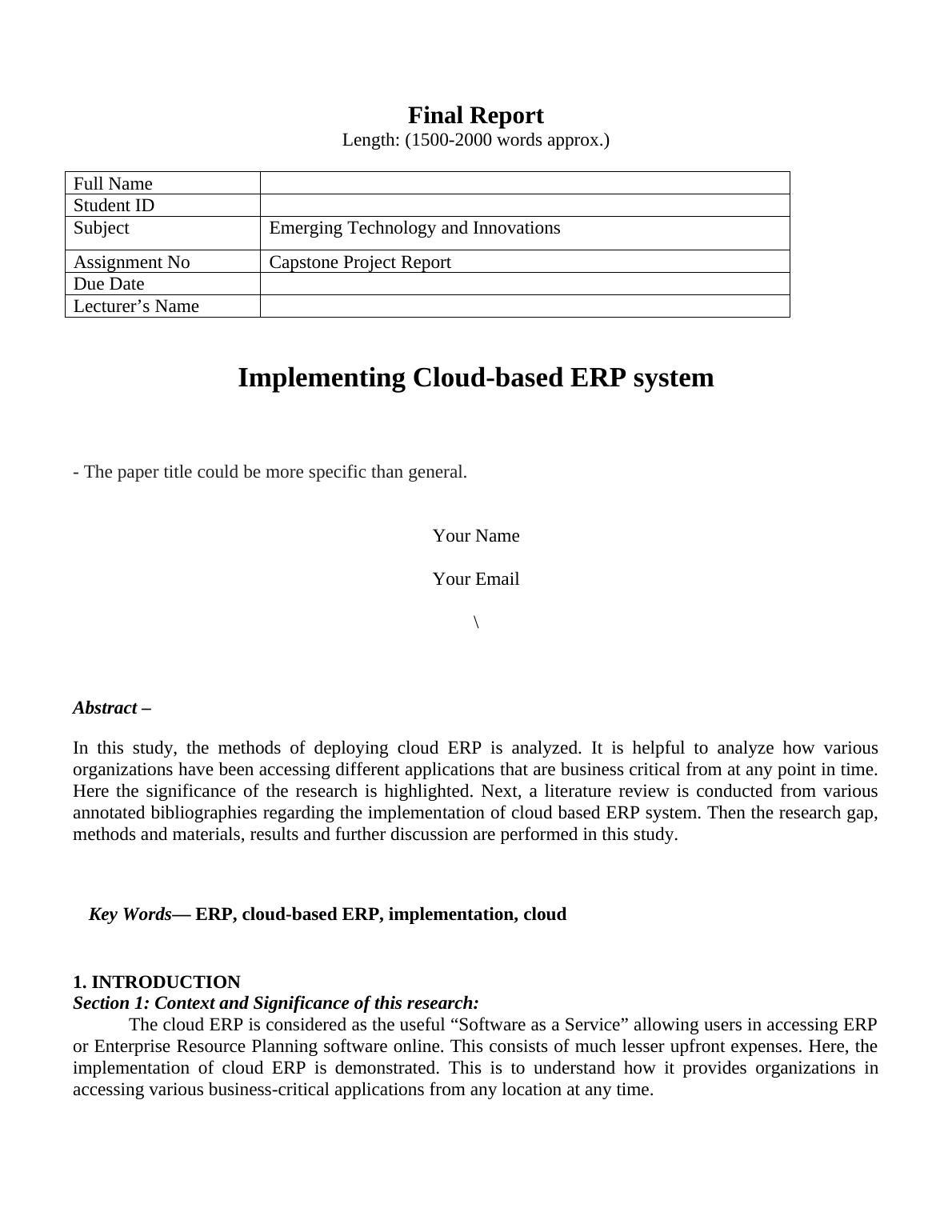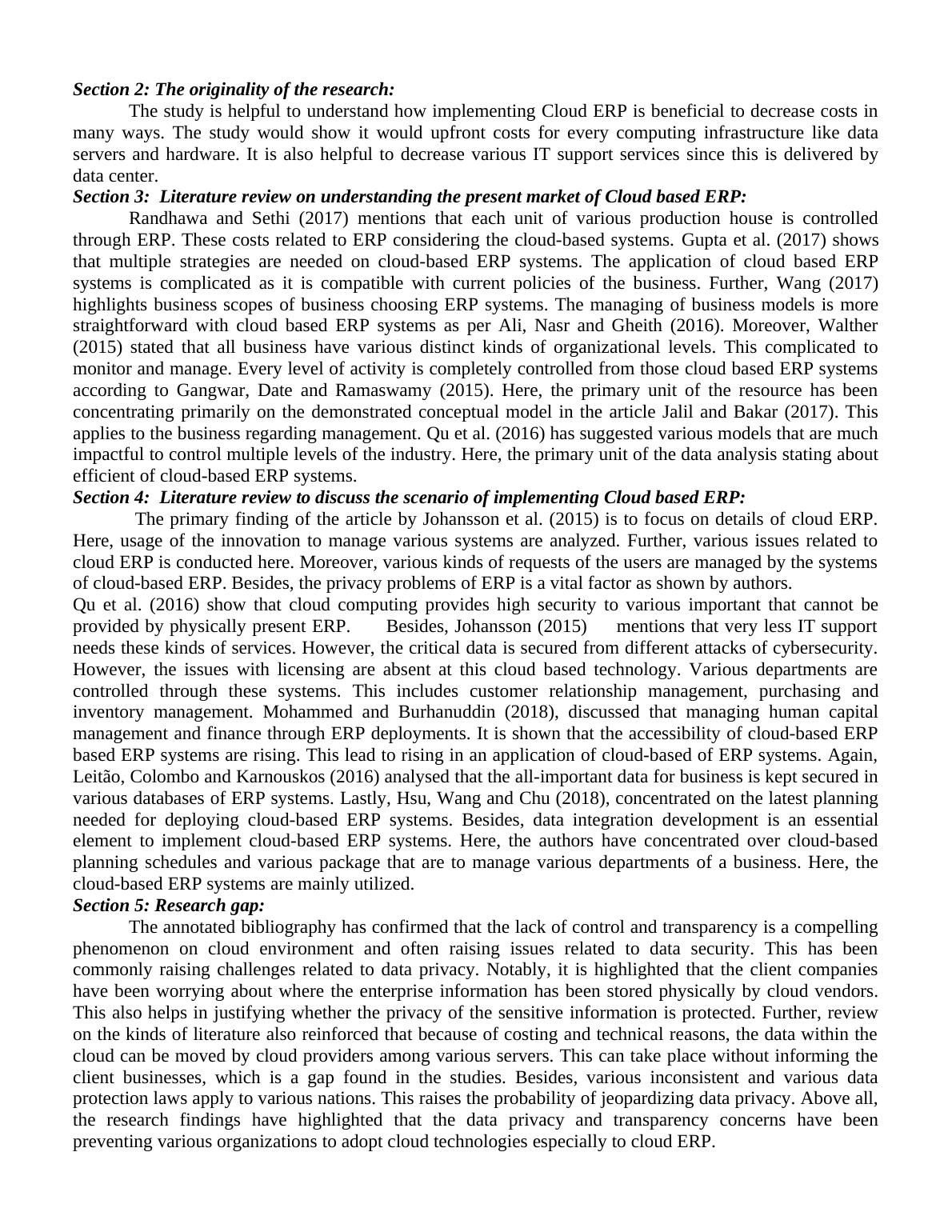Implementing Cloud-based ERP system
Added on 2023-04-22
5 Pages2682 Words430 Views
Final Report
Length: (1500-2000 words approx.)
Full Name
Student ID
Subject Emerging Technology and Innovations
Assignment No Capstone Project Report
Due Date
Lecturer’s Name
Implementing Cloud-based ERP system
- The paper title could be more specific than general.
Your Name
Your Email
\
Abstract –
In this study, the methods of deploying cloud ERP is analyzed. It is helpful to analyze how various
organizations have been accessing different applications that are business critical from at any point in time.
Here the significance of the research is highlighted. Next, a literature review is conducted from various
annotated bibliographies regarding the implementation of cloud based ERP system. Then the research gap,
methods and materials, results and further discussion are performed in this study.
Key Words— ERP, cloud-based ERP, implementation, cloud
1. INTRODUCTION
Section 1: Context and Significance of this research:
The cloud ERP is considered as the useful “Software as a Service” allowing users in accessing ERP
or Enterprise Resource Planning software online. This consists of much lesser upfront expenses. Here, the
implementation of cloud ERP is demonstrated. This is to understand how it provides organizations in
accessing various business-critical applications from any location at any time.
Length: (1500-2000 words approx.)
Full Name
Student ID
Subject Emerging Technology and Innovations
Assignment No Capstone Project Report
Due Date
Lecturer’s Name
Implementing Cloud-based ERP system
- The paper title could be more specific than general.
Your Name
Your Email
\
Abstract –
In this study, the methods of deploying cloud ERP is analyzed. It is helpful to analyze how various
organizations have been accessing different applications that are business critical from at any point in time.
Here the significance of the research is highlighted. Next, a literature review is conducted from various
annotated bibliographies regarding the implementation of cloud based ERP system. Then the research gap,
methods and materials, results and further discussion are performed in this study.
Key Words— ERP, cloud-based ERP, implementation, cloud
1. INTRODUCTION
Section 1: Context and Significance of this research:
The cloud ERP is considered as the useful “Software as a Service” allowing users in accessing ERP
or Enterprise Resource Planning software online. This consists of much lesser upfront expenses. Here, the
implementation of cloud ERP is demonstrated. This is to understand how it provides organizations in
accessing various business-critical applications from any location at any time.

Section 2: The originality of the research:
The study is helpful to understand how implementing Cloud ERP is beneficial to decrease costs in
many ways. The study would show it would upfront costs for every computing infrastructure like data
servers and hardware. It is also helpful to decrease various IT support services since this is delivered by
data center.
Section 3: Literature review on understanding the present market of Cloud based ERP:
Randhawa and Sethi (2017) mentions that each unit of various production house is controlled
through ERP. These costs related to ERP considering the cloud-based systems. Gupta et al. (2017) shows
that multiple strategies are needed on cloud-based ERP systems. The application of cloud based ERP
systems is complicated as it is compatible with current policies of the business. Further, Wang (2017)
highlights business scopes of business choosing ERP systems. The managing of business models is more
straightforward with cloud based ERP systems as per Ali, Nasr and Gheith (2016). Moreover, Walther
(2015) stated that all business have various distinct kinds of organizational levels. This complicated to
monitor and manage. Every level of activity is completely controlled from those cloud based ERP systems
according to Gangwar, Date and Ramaswamy (2015). Here, the primary unit of the resource has been
concentrating primarily on the demonstrated conceptual model in the article Jalil and Bakar (2017). This
applies to the business regarding management. Qu et al. (2016) has suggested various models that are much
impactful to control multiple levels of the industry. Here, the primary unit of the data analysis stating about
efficient of cloud-based ERP systems.
Section 4: Literature review to discuss the scenario of implementing Cloud based ERP:
The primary finding of the article by Johansson et al. (2015) is to focus on details of cloud ERP.
Here, usage of the innovation to manage various systems are analyzed. Further, various issues related to
cloud ERP is conducted here. Moreover, various kinds of requests of the users are managed by the systems
of cloud-based ERP. Besides, the privacy problems of ERP is a vital factor as shown by authors.
Qu et al. (2016) show that cloud computing provides high security to various important that cannot be
provided by physically present ERP. Besides, Johansson (2015) mentions that very less IT support
needs these kinds of services. However, the critical data is secured from different attacks of cybersecurity.
However, the issues with licensing are absent at this cloud based technology. Various departments are
controlled through these systems. This includes customer relationship management, purchasing and
inventory management. Mohammed and Burhanuddin (2018), discussed that managing human capital
management and finance through ERP deployments. It is shown that the accessibility of cloud-based ERP
based ERP systems are rising. This lead to rising in an application of cloud-based of ERP systems. Again,
Leitão, Colombo and Karnouskos (2016) analysed that the all-important data for business is kept secured in
various databases of ERP systems. Lastly, Hsu, Wang and Chu (2018), concentrated on the latest planning
needed for deploying cloud-based ERP systems. Besides, data integration development is an essential
element to implement cloud-based ERP systems. Here, the authors have concentrated over cloud-based
planning schedules and various package that are to manage various departments of a business. Here, the
cloud-based ERP systems are mainly utilized.
Section 5: Research gap:
The annotated bibliography has confirmed that the lack of control and transparency is a compelling
phenomenon on cloud environment and often raising issues related to data security. This has been
commonly raising challenges related to data privacy. Notably, it is highlighted that the client companies
have been worrying about where the enterprise information has been stored physically by cloud vendors.
This also helps in justifying whether the privacy of the sensitive information is protected. Further, review
on the kinds of literature also reinforced that because of costing and technical reasons, the data within the
cloud can be moved by cloud providers among various servers. This can take place without informing the
client businesses, which is a gap found in the studies. Besides, various inconsistent and various data
protection laws apply to various nations. This raises the probability of jeopardizing data privacy. Above all,
the research findings have highlighted that the data privacy and transparency concerns have been
preventing various organizations to adopt cloud technologies especially to cloud ERP.
The study is helpful to understand how implementing Cloud ERP is beneficial to decrease costs in
many ways. The study would show it would upfront costs for every computing infrastructure like data
servers and hardware. It is also helpful to decrease various IT support services since this is delivered by
data center.
Section 3: Literature review on understanding the present market of Cloud based ERP:
Randhawa and Sethi (2017) mentions that each unit of various production house is controlled
through ERP. These costs related to ERP considering the cloud-based systems. Gupta et al. (2017) shows
that multiple strategies are needed on cloud-based ERP systems. The application of cloud based ERP
systems is complicated as it is compatible with current policies of the business. Further, Wang (2017)
highlights business scopes of business choosing ERP systems. The managing of business models is more
straightforward with cloud based ERP systems as per Ali, Nasr and Gheith (2016). Moreover, Walther
(2015) stated that all business have various distinct kinds of organizational levels. This complicated to
monitor and manage. Every level of activity is completely controlled from those cloud based ERP systems
according to Gangwar, Date and Ramaswamy (2015). Here, the primary unit of the resource has been
concentrating primarily on the demonstrated conceptual model in the article Jalil and Bakar (2017). This
applies to the business regarding management. Qu et al. (2016) has suggested various models that are much
impactful to control multiple levels of the industry. Here, the primary unit of the data analysis stating about
efficient of cloud-based ERP systems.
Section 4: Literature review to discuss the scenario of implementing Cloud based ERP:
The primary finding of the article by Johansson et al. (2015) is to focus on details of cloud ERP.
Here, usage of the innovation to manage various systems are analyzed. Further, various issues related to
cloud ERP is conducted here. Moreover, various kinds of requests of the users are managed by the systems
of cloud-based ERP. Besides, the privacy problems of ERP is a vital factor as shown by authors.
Qu et al. (2016) show that cloud computing provides high security to various important that cannot be
provided by physically present ERP. Besides, Johansson (2015) mentions that very less IT support
needs these kinds of services. However, the critical data is secured from different attacks of cybersecurity.
However, the issues with licensing are absent at this cloud based technology. Various departments are
controlled through these systems. This includes customer relationship management, purchasing and
inventory management. Mohammed and Burhanuddin (2018), discussed that managing human capital
management and finance through ERP deployments. It is shown that the accessibility of cloud-based ERP
based ERP systems are rising. This lead to rising in an application of cloud-based of ERP systems. Again,
Leitão, Colombo and Karnouskos (2016) analysed that the all-important data for business is kept secured in
various databases of ERP systems. Lastly, Hsu, Wang and Chu (2018), concentrated on the latest planning
needed for deploying cloud-based ERP systems. Besides, data integration development is an essential
element to implement cloud-based ERP systems. Here, the authors have concentrated over cloud-based
planning schedules and various package that are to manage various departments of a business. Here, the
cloud-based ERP systems are mainly utilized.
Section 5: Research gap:
The annotated bibliography has confirmed that the lack of control and transparency is a compelling
phenomenon on cloud environment and often raising issues related to data security. This has been
commonly raising challenges related to data privacy. Notably, it is highlighted that the client companies
have been worrying about where the enterprise information has been stored physically by cloud vendors.
This also helps in justifying whether the privacy of the sensitive information is protected. Further, review
on the kinds of literature also reinforced that because of costing and technical reasons, the data within the
cloud can be moved by cloud providers among various servers. This can take place without informing the
client businesses, which is a gap found in the studies. Besides, various inconsistent and various data
protection laws apply to various nations. This raises the probability of jeopardizing data privacy. Above all,
the research findings have highlighted that the data privacy and transparency concerns have been
preventing various organizations to adopt cloud technologies especially to cloud ERP.

End of preview
Want to access all the pages? Upload your documents or become a member.
Related Documents
Exploring Emerging Technologies: Cloud-Based ERP Implementation and Innovationlg...
|10
|629
|371
BUSN20016 - Research in Business - Cloud based ERP systemlg...
|7
|1126
|88
Cloud Based ERP Services (ITECH 5402)lg...
|12
|2721
|115
Implementation of Cloud Based ERP systemlg...
|14
|3653
|93
Challenges of Cloud ERPlg...
|14
|3436
|340
Advanced Information Systems Designlg...
|3
|448
|63
